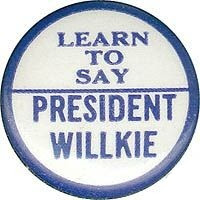Learn to Say President Willkie

Wendell Willkie was born on this day in 1892 in Elwood, Indiana.
Wendell Willkie blazed in and out of American politics with the short-lived intensity of a spark of static electricity. An unlikely presidential candidate, he was the model of the dilettante crusader, the role Ross Perot seemed to fill in 1990s American politics. His father and mother were both lawyers, and he was raised to become a lawyer himself and a good Democrat. After serving in the artillery at the Meuse-Argonne front in World War I, he joined Firestone Tire and Rubber Co. in Akron, Ohio as an in-house lawyer. In 1929, he moved to New York City to work for and later head Commonwealth & Southern, a large electric utility company.
Although he had campaigned for Franklin Roosevelt in 1920 when Roosevelt was on the Cox for President ticket and had contributed $150 to Roosevelt's 1932 campaign, Willkie became a strident opponent of Roosevelt's New Deal excesses -- particularly Roosevelt's establishment of the Tennessee Valley Authority (TVA) by which cheap electricity was introduced to rural Tennessee through federal projects which competed with Willkie's own utility company. Although Willkie generally supported the New Deal conceptually, his ire over the TVA led him to denounce Roosevelt on a national speaking tour.
His natural charisma appealed to the anti-Roosevelt minority, and "Willkie Clubs" began to spring up around the country, leading a group of Eastern Republicans to convince Willkie, who had never held public office, to switch parties and seek the Republican presidential nomination in 1940. With conservative Robert Taft and a too-young Thomas Dewey as his only credible opponents, the Republicans unanimously rallied around Willkie at the convention on the 6th ballot.
Ideologically similar to Roosevelt, Willkie supported intervention in Europe and much of Roosevelt's economic policies. Nevertheless he barnstormed 30,000 miles around the country giving more than 500 speeches criticizing Roosevelt's aspirations for a third term (employing the words of George Washington as moral precedent for presidents not serving more than two terms). He was enough of a thorn in Roosevelt's side that Roosevelt considered leaking a story that Willkie carried on adulterous affair. Roosevelt decided against the strategy, and the voters decided that Willkie did not offer enough of a reason to change horses in midstream: Roosevelt defeated Willkie, 55% to 45%.
After the election, Roosevelt dispatched Willkie to Europe to visit allied governments on behalf of the U.S. He published a best-selling book, One World, in support of international cooperation, and pursued the Republican nomination again in 1944, but withdrew from the race after a poor showing in the Wisconsin primary. He died shortly thereafter, on October 8, 1944, in New York.






0 Comments:
Post a Comment
Subscribe to Post Comments [Atom]
<< Home